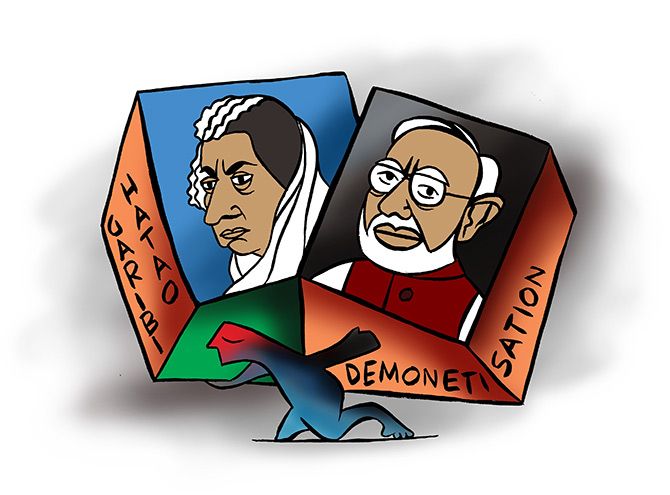'Some BJP old timers have remarked that the BJP is now driven by its own high command, the way the Congress was under Mrs Gandhi, says Subir Roy.
Illustration: Uttam Ghosh/Rediff.com

There are remarkable parallels between the evolution of the careers of Indira Gandhi and Narendra Modi.
While the two careers are naturally not identical, the similarities are too powerful to ignore.
Mrs Gandhi consolidated her position at the top by splitting the Congress party and thereby ousting the old guard who made up the 'Syndicate' and expected her to be a puppet in their hands.
Mr Modi has not done anything as dramatic, but put the old guard in the BJP permanently on the shelf, much to their chagrin.
On becoming prime minister and seeking to consolidate her position as a national leader with grassroots support, Mrs Gandhi launched the historic Garibi Hatao programme which endeared her to India's poor.
Mr Modi won his remarkable 2014 victory by making vikas (development) the primary plank of his election campaign.
This made his appeal truly broad-based, causing the young and the aspiring to vote across traditional caste and even religious lines.
Mrs Gandhi did not just offer hope to India's poor, she also tapped into their resentment against the rich through the abolition of princely privy purses.
The princes, a relic of the past, even lost the right to officially call themselves so.
Mr Modi similarly cashed in on the resentment among the poor towards the rich through demonetisation.
Why the decision was actually undertaken is not known, beyond the official reason of starting a war on black money.
But it created a tremendous feeling among the poor of 'serves them right' towards the rich who are seen as having amassed wealth at the cost of the rest and not paid taxes.
I have come across huge anecdotal evidence among people like maidservants and drivers whose attitude has been: 'We are willing to bear the suffering if only because it will take away the ill-gotten wealth of the rich.' Or so they thought.
What Mrs Gandhi did to the Congress party and what Mr Modi is doing to the BJP also have a lot in common.
She destroyed party leadership down the line and made the party structure entirely subservient to her.
State leaders who survived did so only no her say so.
Demonetisation hit hard an important support base of the BJP, the trading community.
From small to large businessmen who were not corporatised and did a lot of their business in cash -- from gold to diamond trading -- all felt let down.
Then in the run-up to the UP assembly elections, there was a large exodus of sectional leaders with their entourages from the Congress, Samajwadi Party and the Bahujan Samaj Party into the BJP.
Not only did many of them get tickets for the polls, among those who won, several have been made ministers.
What this has done to the morale of the local BJP leaders who have been left out in the cold can be imagined.
The last straw is the way in which the UP chief minister was chosen.
Some BJP old timers have remarked, naturally off the record, that the BJP is now driven by its own 'high command,' the way the Congress was under Mrs Gandhi.
The last and in some ways vital is the way in which Mrs Gandhi dealt with the higher judiciary.
In getting the Supreme Court to see her way she packed it with 'committed' judges.
For Mr Modi it is still early days, but the then appointment of Chief Justice Jagdish Singh Khehar and subsequent decisions by the Supreme Court are pointers.
Justice Khehar handed down two decisions which go part of the way in making life easier for Mr Modi's government.
One, the long delayed memorandum of procedure for the appointment of senior judges was cleared with the court agreeing to consider the issue of national security.
Two, the court rejected the Congress petition challenging the Goa governor's decision to ask the BJP, not the Congress, the single largest party, to form the government.
Fali Nariman told The Indian Express in forthright terms that his 'understanding of the law and the precedents (benches of nine and five judges, respectively) is that the governor of a state is under Constitutional duty to first invite the leader of the single-largest party to form the government.'
Just before Chief Justice Khehar's appointment, advocate Prashant Bhushan asked him to recuse himself from hearing the Birla-Sahara payoff case involving allegations of Mr Modi receiving payoffs while he was Gujarat chief minister.
Mr Bhushan said Justice Khehar should withdraw as his file for elevation was pending before the prime minister.
Justice Khehar termed Mr Bhushan's position 'unfair' and 'unreasonable.'
Since there is nothing conclusive to go by, the jury is still out on whether Mr Modi is on his way to getting the higher judiciary to fall in line with him.
The biggest difference between Mrs Gandhi and Mr Modi is, of course, on the issue of secularism.
Mrs Gandhi of Emergency fame had dictatorial tendencies, but stood by secularism.
Mr Modi has been different.
Allegedly by first playing the communal card and allowing the 2002 Gujarat riots to happen, and then putting the Vishva Hindu Parishad and the Rashtriya Swayamsevak Sangh in their place in the state, Mr Modi has indicated that he can both play the communal card and set it aside when it suits him.
We had the Hindu consolidation in the UP elections and Yogi Adityanath's choice as chief minister.
If the first was very much Mr Modi's idea, was his hand forced on the second?











